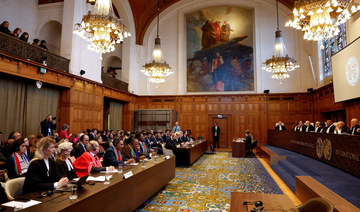SAN ANTONIO: Some immigrant US Army reservists and recruits who enlisted in the military with a promised path to citizenship are being abruptly discharged, the Associated Press has learned.
The AP was unable to quantify how many men and women who enlisted through the special recruitment program have been booted from the Army, but immigration attorneys say they know of more than 40 who have been discharged or whose status has become questionable, jeopardizing their futures.
“It was my dream to serve in the military,” said reservist Lucas Calixto, a Brazilian immigrant who filed a lawsuit against the Army last week. “Since this country has been so good to me, I thought it was the least I could do to give back to my adopted country and serve in the United States military.”
Some of the service members say they were not told why they were being discharged. Others who pressed for answers said the Army informed them they’d been labeled as security risks because they have relatives abroad or because the Defense Department had not completed background checks on them.
Spokespeople for the Pentagon and the Army said that, due to the pending litigation, they were unable to explain the discharges or respond to questions about whether there have been policy changes in any of the military branches.
Eligible recruits are required to have legal status in the US, such as a student visa, before enlisting. More than 5,000 immigrants were recruited into the program in 2016, and an estimated 10,000 are currently serving. Most go the Army, but some also go to the other military branches.
To become citizens, the service members need an honorable service designation, which can come after even just a few days at boot camp. But the recently discharged service members have had their basic training delayed, so they can’t be naturalized.
Margaret Stock, an Alaska-based immigration attorney and a retired Army Reserve lieutenant colonel who helped create the immigrant recruitment program, said she’s been inundated over the past several days by recruits who have been abruptly discharged.
All had signed enlistment contracts and taken an Army oath, Stock said. Many were reservists who had been attending unit drills, receiving pay and undergoing training, while others had been in a “delayed entry” program, she said.
“Immigrants have been serving in the Army since 1775,” Stock said. “We wouldn’t have won the revolution without immigrants. And we’re not going to win the global war on terrorism today without immigrants.”
Stock said the service members she’s heard from had been told the Defense Department had not managed to put them through extensive background checks, which include CIA, FBI and National Intelligence Agency screenings and counterintelligence interviews. Therefore, by default, they do not meet the background check requirement.
“It’s a vicious cycle,” she said.
The AP interviewed Calixto and recruits from Pakistan and Iran, all of whom said they were devastated by their unexpected discharges.
“Now the great feeling I had when I enlisted is going down the drain,” said Calixto, 28. “I don’t understand why this is happening.”
In hopes of undoing the discharge, he filed a lawsuit in Washington, D.C., last week alleging the Defense Department hadn’t given him a chance to defend himself or appeal. He said he was given no specific grounds other than “personnel security.”
Calixto, who lives in Massachusetts and came to the US when he was 12, said in an email interview arranged through his attorney that he joined the Army out of patriotism.
In the suit, Calixto said he learned he was being kicked out soon after he was promoted to private second class.
The Pakistani service member who spoke to the AP said he learned in a phone call a few weeks ago that his military career was over.
“There were so many tears in my eyes that my hands couldn’t move fast enough to wipe them away,” he said. “I was devastated, because I love the US and was so honored to be able to serve this great country.”
He asked that his name be withheld because he fears he might be forced to return to Pakistan, where he could face danger as a former US Army enlistee.
Portions of the 22-year-old’s military file reviewed by the AP said he was so deeply loyal to the US that his relationships with his family and fiancee in Pakistan would not make him a security threat. Nonetheless, the documents show the Army cited those foreign ties as a concern.
The man had enlisted in April 2016 anticipating he’d be a citizen within months, but faced a series of delays. He had been slated to ship out to basic training in January 2017, but that also was delayed.
An Iranian citizen who came to the US for a graduate degree in engineering told the AP that he enlisted in the program hoping to gain medical training. He said he had felt proud that he was “pursuing everything legally and living an honorable life.”
In recent weeks, he said, he learned that he’d been discharged.
“It’s terrible because I put my life in the line for this country, but I feel like I’m being treated like trash,” he said. “If I am not eligible to become a US citizen, I am really scared to return to my country.”
He spoke on condition of anonymity because of those fears.
It’s unclear how the service members’ discharges could affect their status as legal immigrants.
In a statement, the Defense Department said: “All service members (i.e. contracted recruits, active duty, Guard and Reserve) and those with an honorable discharge are protected from deportation.”
However, immigration attorneys told the AP that many immigrants let go in recent weeks were an “uncharacterized discharge,” neither dishonorable nor honorable.
The service members affected by the recent discharges all enlisted in recent years under a special program aimed at bringing medical specialists and fluent speakers of 44 sought-after languages into the military. The idea, according to the Defense Department, was to “recognize their contribution and sacrifice.”
President George W. Bush ordered “expedited naturalization” for immigrant soldiers in 2002 in an effort to swell military ranks. Seven years later the Military Accessions Vital to the National Interest program, known as MAVNI, became an official recruiting program.
It came under fire from conservatives when President Barack Obama added DACA recipients — young immigrants who were brought to the US illegally — to the list of eligible enlistees. In response, the military layered on additional security clearances for recruits to pass before heading to boot camp.
The Trump Administration added even more hurdles, creating a backlog within the Defense Department. Last fall, hundreds of recruits still in the enlistment process had their contracts canceled. A few months later, the military suspended MAVNI.
Republican Congressman Andy Harris of Maryland, who has supported legislation to limit the program, told the AP that MAVNI was established by executive order and never properly authorized by Congress.
“Our military must prioritize enlisting American citizens, and restore the MAVNI program to its specialized, limited scope,” he said.
Non-US citizens have served in the military since the Revolutionary War, when Continental soldiers included Irish, French and Germans. The US recruited Filipino nationals to serve in the Navy in the 1940s, and worked to enlist Eastern Europeans in the military over the next decade, according to the Defense Department.
Since Sept. 11, 2001, nearly 110,000 members of the Armed Forces have gained citizenship by serving in the US military, according to the Defense Department.
Many service members recruited through the program have proven to be exemplary. In 2012, then-Sgt. Saral K. Shrestha, originally from Nepal, was named US Army Soldier of the Year.
In general, the immigrant recruits have been more cost-effective, outperforming their fellow soldiers in the areas of attrition, performance, education and promotions, according to a recently released review by the RAND Corporation, a nonprofit research institution.
The AP spoke with a 26-year-old woman from Dominica who said she proudly enlisted in the immigrant recruitment program in 2016 while earning her nursing degree. She said she drilled each month with her reserve unit, which gave her an award, and had been awaiting a date to start basic training.
But in March, she said she looked up her profile on an Army portal and saw that the section about her security eligibility was marked “loss of jurisdiction,” with no further explanation. The next month, her attorney said she found the reservist’s name listed as “unsuitable” on a spreadsheet created by the Defense Department.
The reservist, who spoke on condition of anonymity because of concerns about her legal standing, said she received additional paperwork last month that indicated her case is awaiting a final decision.
“I have always been a good soldier and have always done what they ask me to do,” she said. “I got into debt when I joined the Army because I can’t work legally but, financially, I can’t survive anymore. I don’t want to give up because I genuinely like being in the Army. But I don’t know who to turn to.”
In recent years, a group of attorneys have been fighting to keep their recruited immigrant clients eligible for naturalization as delays have mounted. Some have been successful, including nearly 50 recruits who were granted a type of temporary status while their background investigations are being completed.
“Some of our clients have finally emerged through the system and at least are doing basic training,” said Donald Friedman, a Washington attorney with Perkins Coie.
US Army quietly discharging immigrant recruits
US Army quietly discharging immigrant recruits

US announces $6 billion in security aid for Ukraine

- The package is the second this week, following another valued at $1 billion
- Ukraine’s President Volodymyr Zelensky said the US delay in approving new assistance has been costly for Kyiv
WASHINGTON: Defense Secretary Lloyd Austin on Friday announced the United States will provide key air defense munitions and artillery rounds to Ukraine as part of a $6 billion military aid package that is its largest ever for Kyiv.
The package is the second this week, following another valued at $1 billion that was announced just after US President Joe Biden signed a much-delayed bill to provide new funding for Ukraine as it struggles to hold back Russian advances.
“This is the largest security assistance package that we’ve committed to date,” Austin told journalists following the conclusion of a virtual meeting of dozens of Kyiv’s international supporters.
“They need air defense interceptors, they need artillery systems and munitions. They need... armored vehicles, they need maintenance and sustainment. So all of those kinds of things are included” in the package,” he said.
Ukraine has in recent months pleaded for more air defenses from its Western allies as it struggles to fend off a surge in deadly attacks on civilian infrastructure, and the new package includes interceptors for both Patriot and NASAMS air defense systems.
But unlike the $1 billion package announced Wednesday, which featured items that will be drawn from US stocks, the latest assistance will be procured from the defense industry, meaning it will take longer to arrive on the battlefield.
Speaking at the opening of the virtual meeting, Ukraine’s President Volodymyr Zelensky said the US delay in approving new assistance has been costly for Kyiv.
“While we were waiting for a decision on the American support, the Russian army managed to seize the initiative on the battlefield,” Zelensky said.
“We can still now not only stabilize the front, but also move forward, achieving our Ukrainian goals in the war,” he said, while noting that “Ukrainian defenders need your sufficient and timely support.”
A senior US defense official said this week that “Ukrainian forces have been rationing their ammunition for quite some time, rationing their capabilities.”
Aid from the United States and other countries “will enable the Ukrainians to begin to retake the initiative,” but “this will not be a rapid process,” the official said on condition of anonymity.
“The Ukrainians will need to rebuild quite a bit to take on board all of these new supplies... and ensure that they can defend their positions. So I would not forecast any large-scale offensive in the near-term,” the official added.
The United States has been a key military backer of Ukraine, committing tens of billions of dollars in security assistance since Russia launched its full-scale invasion in February 2022.
But prior to this week, Washington had announced new aid for Ukraine on just one other occasion this year, a $300 million package in March that was only made possible by using money that the Pentagon had saved on other purchases.
A squabbling Congress had not approved large-scale funding for Kyiv for nearly a year and a half, but eventually took action starting last week after months of acrimonious debate among lawmakers over how or even whether to help Ukraine defend itself.
The US House of Representatives on April 20 approved legislation authorizing $95 billion in aid funding, including $61 billion for Ukraine, while the Senate passed the measure on Tuesday and Biden signed it into law the following day.
It’s 30 years since apartheid ended. South Africa’s celebrations are set against growing discontent

- South Africa is still the most unequal country in the world in terms of wealth distribution, according to the World Bank, with race a key factor
- While the damage of apartheid remains difficult to undo, the ANC is increasingly being blamed for South Africa’s current problems
PRETORIA: South Africa marked 30 years since the end of apartheid and the birth of its democracy with a ceremony in the capital Saturday that included a 21-gun salute and the waving of the nation’s multicolored flag.
But any sense of celebration on the momentous anniversary was set against a growing discontent with the current government.
President Cyril Ramaphosa presided over the gathering in a huge white tent in the gardens of the government buildings in Pretoria as head of state.
He also spoke as the leader of the African National Congress party, which was widely credited with liberating South Africa’s Black majority from the racist system of oppression that made the country a pariah for nearly a half-century.
The ANC has been in power ever since the first democratic, all-race election of April 27, 1994, the vote that officially ended apartheid.
But this Freedom Day holiday marking that day fell amid a poignant backdrop: Analysts and polls predict that the waning popularity of the party once led by Nelson Mandela is likely to see it lose its parliamentary majority for the first time as a new generation of South Africans make their voices heard in what might be the most important election since 1994 next month.

“Few days in the life of our nation can compare to that day, when freedom was born,” Ramaphosa said in a speech centered on the nostalgia of 1994, when Black people were allowed to vote for the first time, the once-banned ANC swept to power, and Mandela became the country’s first Black president. “South Africa changed forever. It signaled a new chapter in the history of our nation, a moment that resonated across Africa and across the world.”
“On that day, the dignity of all the people of South Africa was restored,” Ramaphosa said.
The president, who stood in front of a banner emblazoned with the word “Freedom,” also recognized the major problems South Africa still has three decades later with vast poverty and inequality, issues that will be central yet again when millions vote on May 29. Ramaphosa conceded there had been “setbacks.”
The 1994 election changed South Africa from a country where Black and other nonwhite people were denied most basic freedoms, not just the right to vote. Laws controlled where they lived, where they were allowed to go on any given day, and what jobs they could have. After apartheid fell, a constitution was adopted guaranteeing the rights of all South Africans no matter their race, religion, gender or sexuality.
But that hasn’t significantly improved the lives of millions, with South Africa’s Black majority that make up more than 80 percent of the population of 62 million still overwhelmingly affected by severe poverty.
The official unemployment rate is 32 percent, the highest in the world, and more than 60 percent for young people between the ages of 15 and 24. More than 16 million South Africans — 25 percent of the country — rely on monthly welfare grants for survival.

South Africa is still the most unequal country in the world in terms of wealth distribution, according to the World Bank, with race a key factor.
While the damage of apartheid remains difficult to undo, the ANC is increasingly being blamed for South Africa’s current problems.
In the week leading up to the anniversary, countless South Africans were asked what 30 years of freedom from apartheid meant to them. The dominant response was that while 1994 was a landmark moment, it’s now overshadowed by the joblessness, violent crime, corruption and near-collapse of basic services like electricity and water that plagues South Africa in 2024.
It’s also poignant that many South Africans who never experienced apartheid and are referred to as “Born Frees” are now old enough to vote.
Outside the tent where Ramaphosa spoke in front of mostly dignitaries and politicians, a group of young Black South Africans born after 1994 and who support a new political party called Rise Mzansi wore T-shirts with the words “2024 is our 1994” on them. Their message was that they were looking beyond the ANC and for another change for their future in next month’s election.
“They don’t know what happened before 1994. They don’t know,” said Seth Mazibuko, an older supporter of Rise Mzansi and a well-known anti-apartheid activist in the 1970s.
“Let us agree that we messed up,” Mazibuko said of the last 30 years, which have left the youngsters standing behind him directly impacted by the second-worst youth unemployment rate in the world behind Djibouti.
He added: “There’s a new chance in elections next month.”
A strong magnitude 6.1 earthquake shakes Indonesia’s Java Island, felt in Jakarta

- Indonesia, a seismically active archipelago of 270 million people, is prone to seismic upheaval because of its location on major geological faults known as the Pacific “Ring of Fire”
JAKARTA, Indonesia: A strong magnitude 6.1 earthquake shook the southern part of Indonesia’s main island of Java on Saturday, but there were no immediate reports of injury or significant property damage.
The US Geological Survey said the quake struck 102 kilometers (63 miles) south of Banjar city at a depth of 68.3 kilometers (42.4 miles). There was no tsunami warning.
High-rises in the capital Jakarta swayed for around a minute and two-story homes shook strongly in the West Java provincial capital of Bandung and in Jakarta’s satellite cities of Depok, Tangerang, Bogor and Bekasi. The quake was also felt in other cities in West Java, Yogyakarta and East Java province, according to Indonesia’s Meteorology, Climatology and Geophysical Agency.
The agency warned of possible aftershocks.
Earthquakes are frequent across the sprawling archipelago nation, but they are rarely felt in Jakarta.
Indonesia, a seismically active archipelago of 270 million people, is prone to seismic upheaval because of its location on major geological faults known as the Pacific “Ring of Fire.”
A magnitude 5.6 earthquake in 2022 killed at least 602 people in West Java’s Cianjur city. It was the deadliest in Indonesia since a 2018 quake and tsunami in Sulawesi killed more than 4,300 people.
In 2004, an extremely powerful Indian Ocean quake set off a tsunami that killed more than 230,000 people in a dozen countries, most of them in Indonesia’s Aceh province.
US intel suggests Putin may not have ordered Navalny death in prison: WSJ

- The Russian prison service said that Navalny collapsed on February 16 after a walk at the isolated camp
WASHINGTON: US intelligence agencies believe that while the Russian president was ultimately responsible for the death of opposition leader Alexei Navalny, he didn’t order it to take place when it did, the Wall Street Journal reported Saturday.
The finding, which the Journal said was based on both classified intelligence and an analysis of public facts, raises new questions about Navalny’s death in a remote Arctic prison camp, which led to a new round of sanctions against President Vladimir Putin’s Russia.
Among those facts was the timing of the opposition leader’s death in mid-February, which overshadowed Putin’s reelection a month later.
While the new finding does not question Putin’s responsibility for Navalny’s death, the CIA and other US intelligence agencies believe he probably didn’t order it “at that moment,” the Journal said, quoting people familiar with the matter.
It said that some European officials, briefed on the US finding, were skeptical that the 47-year-old dissident could have been targeted without Putin’s prior knowledge, given the tight controls in today’s Russia.
President Joe Biden and several other world leaders have publicly expressed little doubt about the matter. “Make no mistake. Putin is responsible for Navalny’s death,” Biden said after the stunning news of the death emerged.
The Russian prison service said that Navalny collapsed on February 16 after a walk at the isolated camp. It said attempts to revive him failed.
Navalny had seemed relatively healthy and in good spirits when seen in a video just a day earlier.
A week before that, he reportedly had been the subject of high-level talks over a potential prisoner swap that could have freed him.
Navalny had been serving a 19-year prison sentence on charges he and his backers insist were fabricated.
He had earlier survived a poisoning that US and other investigators blamed on the Kremlin. Russian officials have denied culpability in the poisoning or in his death.
A number of prominent Kremlin opponents have died, been jailed and or forced into exile in recent years.
Reached by AFP, the National Security Council declined to comment on the report.
Some US officials say in internal memo Israel may be violating international law in Gaza

- The submissions to the memo provide the most extensive picture to date of the divisions inside the State Department over whether Israel might be violating international humanitarian law in Gaza
WASHINGTON: Some senior US officials have advised Secretary of State Antony Blinken that they do not find “credible or reliable” Israel’s assurances that it is using US-supplied weapons in accordance with international humanitarian law, according to an internal State Department memo reviewed by Reuters.
Other officials upheld support for Israel’s representation.
Under a National Security Memorandum (NSM) issued by President Joe Biden in February, Blinken must report to Congress by May 8 whether he finds credible Israel’s assurances that its use of US weapons does not violate US or international law.
By March 24, at least seven State Department bureaus had sent in their contributions to an initial “options memo” to Blinken. Parts of the memo, which has not been previously reported, were classified.
The submissions to the memo provide the most extensive picture to date of the divisions inside the State Department over whether Israel might be violating international humanitarian law in Gaza.
“Some components in the department favored accepting Israel’s assurances, some favored rejecting them and some took no position,” a US official said.
A joint submission from four bureaus — Democracy Human Rights & Labor; Population, Refugees and Migration; Global Criminal Justice and International Organization Affairs – raised “serious concern over non-compliance” with international humanitarian law during Israel’s prosecution of the Gaza war.
The assessment from the four bureaus said Israel’s assurances were “neither credible nor reliable.” It cited eight examples of Israeli military actions that the officials said raise “serious questions” about potential violations of international humanitarian law.
These included repeatedly striking protected sites and civilian infrastructure; “unconscionably high levels of civilian harm to military advantage“; taking little action to investigate violations or to hold to account those responsible for significant civilian harm and “killing humanitarian workers and journalists at an unprecedented rate.”
The assessment from the four bureaus also cited 11 instances of Israeli military actions the officials said “arbitrarily restrict humanitarian aid,” including rejecting entire trucks of aid due to a single “dual-use” item, “artificial” limitations on inspections as well as repeated attacks on humanitarian sites that should not be hit.
Another submission to the memo reviewed by Reuters, from the bureau of Political and Military Affairs, which deals with US military assistance and arms transfers, warned Blinken that suspending US weapons would limit Israel’s ability to meet potential threats outside its airspace and require Washington to re-evaluate “all ongoing and future sales to other countries in the region.”
Any suspension of US arms sales would invite “provocations” by Iran and aligned militias, the bureau said in its submission, illustrating the push-and-pull inside the department as it prepares to report to Congress.
The submission did not directly address Israel’s assurances.
Inputs to the memo from the Office of the Special Envoy to Monitor and Combat Antisemitism and US ambassador to Israel Jack Lew said they assessed Israel’s assurances as credible and reliable, a second US official told Reuters.
The State Department’s legal bureau, known as the Office of the Legal Adviser, “did not take a substantive position” on the credibility of Israel’s assurances, a source familiar with the matter said.
State Department spokesperson Matthew Miller said the agency doesn’t comment on leaked documents.
“On complex issues, the Secretary often hears a diverse range of views from within the Department, and he takes all of those views into consideration,” Miller said.
MAY 8 REPORT TO CONGRESS
When asked about the memo, an Israeli official said: “Israel is fully committed to its commitments and their implementation, among them the assurances given to the US government.”
The White House did not respond to a request for comment.
Biden administration officials repeatedly have said they have not found Israel in violation of international law.
Blinken has seen all of the bureau assessments about Israel’s pledges, the second US official said.
Matthew Miller on March 25 said the department received the pledges. However, the State Department is not expected to render its complete assessment of credibility until the May 8 report to Congress.
Further deliberations between the department’s bureaus are underway ahead of the report’s deadline, the US official said.
USAID also provided input to the memo. “The killing of nearly 32,000 people, of which the GOI (Government of Israel) itself assesses roughly two-thirds are civilian, may well amount to a violation of the international humanitarian law requirement,” USAID officials wrote in the submission.
USAID does not comment on leaked documents, a USAID spokesperson said.
The warnings about Israel’s possible breaches of international humanitarian law made by some senior State Department officials come as Israel is vowing to launch a military offensive into Rafah, the southern-most pocket of the Gaza Strip that is home to over a million people displaced by the war, despite repeated warnings from Washington not to do so.
Israel’s military conduct has come under increasing scrutiny as its forces have killed 34,000 Palestinians in Gaza, according to the enclave’s health authorities, most of them women and children.
Israel’s assault was launched in response to the Hamas attack on Israel on Oct. 7, in which Israel says 1,200 people were killed and 250 others taken hostage.
The National Security Memorandum was issued in early February after Democratic lawmakers began questioning whether Israel was abiding by international law.
The memorandum imposed no new legal requirements but asked the State Department to demand written assurances from countries receiving US-funded weapons that they are not violating international humanitarian law or blocking US humanitarian assistance.
It also required the administration to submit an annual report to Congress to assess whether countries are adhering to international law and not impeding the flow of humanitarian aid.
If Israel’s assurances are called into question, Biden would have the option to “remediate” the situation through actions ranging from seeking fresh assurances to suspending further US weapons transfers, according to the memorandum.
Biden can suspend or put conditions on US weapons transfers at any time.
He has so far resisted calls from rights groups, left-leaning Democrats and Arab American groups to do so.
But earlier this month he threatened for the first time to put conditions on the transfer of US weapons to Israel, if it does not take concrete steps to improve the dire humanitarian situation in Gaza.





















